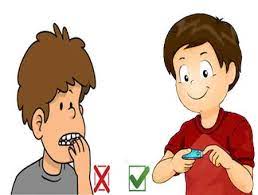How To Break Bad Habits In Children?

Children are innocent. As they grow, they tend to pick up some harmful habits, which could also be socially inappropriate. They often tend to pick up on habits that they see in their environment. They are unable to differentiate between right and wrong and there can be many reasons for them to develop these habits- some imitate adults; others discover something relaxing and repeat it.
Childhood habits are harmless and tend to disappear, especially if you refrain from dwelling on them. As a parent, it is wise to act immediately.
Here are some strategies to follow when your child picks up on the following bad habits-
 Thumb sucking– Thumb sucking is a normal behavior until the age of 3. Most children give it up at the age of 3 or 4, but very few continue it beyond 6 years. If a child continues to suck his/her thumb after permanent teeth have come in, the teeth could be misaligned. Studies have shown that this habit could also lower their self-esteem and confidence.
Thumb sucking– Thumb sucking is a normal behavior until the age of 3. Most children give it up at the age of 3 or 4, but very few continue it beyond 6 years. If a child continues to suck his/her thumb after permanent teeth have come in, the teeth could be misaligned. Studies have shown that this habit could also lower their self-esteem and confidence.
What can be done-
- Though this habit is difficult to get rid of, it is not impossible. Distract your child by getting him/her involved in activities that require the use of both hands
- You could also try applying bitter-tasting juices on their thumbs to keep them from sucking
- Using positive reinforcements like rewarding and appreciating them when they aren’t sucking their thumb
 Nail biting- Children often bite their nails when they are nervous, bored or completely indulged in a particular activity. Though this may sound like a harmless activity, it creates many health problems like skin and cuticles inflammation around the nail, bleeding and infection.
Nail biting- Children often bite their nails when they are nervous, bored or completely indulged in a particular activity. Though this may sound like a harmless activity, it creates many health problems like skin and cuticles inflammation around the nail, bleeding and infection.
What can be done-
- Yelling won’t help. Rather than just expecting your child to get rid of the habit by themselves, talk to them about it. Tell them about the possible unhealthy and unhygienic outcomes that may result from it
- Use a moisturizer to lubricate your child’s nails. Moisturizing their hands keeps them away from further infections around the nails
 Nose picking- Nose picking is an annoying habit often performed by kids of various ages. Usually, a child unknowingly puts his finger in his nose. They either eat the mucus or wipe it on anything that happens to be nearby. Frequent nose picking sometimes causes scabs and sores inside the nostrils. It can increase the risk of colds as respiratory viruses are transferred from the hands to the nose.
Nose picking- Nose picking is an annoying habit often performed by kids of various ages. Usually, a child unknowingly puts his finger in his nose. They either eat the mucus or wipe it on anything that happens to be nearby. Frequent nose picking sometimes causes scabs and sores inside the nostrils. It can increase the risk of colds as respiratory viruses are transferred from the hands to the nose.
What can be done-
- Try to make sure you do not resort to punishing or shaming your child to break the habit. It might have a reverse effect, and your child may end up increasing the activity aggressively with anger
- Start by teaching your child to blow their nose using a handkerchief or a tissue to clear their nasal cavity
- You can use a humidifier or vaporizer to help heal and soften irritating scabs
- It is all about being educational rather than being judgmental. Parents should educate their children about the cons of picking their noses in public. When you are in a public gathering, and the situation arises where you need to remind your child to not engage in the habit, use a pre-decided secret code. Inculcating this might create a way for an assured change in your child.
 Frequent lying- Whether it is your older child lying about doing the chores or your younger child making false allegations to his/her sibling, they all lie at some point. Children lie for various reasons; they often lie to get something they want, to avoid doing something, to gain someone’s approval, become the center of focus, or just out of impulse. This habit could get worse with time if not attended to.
Frequent lying- Whether it is your older child lying about doing the chores or your younger child making false allegations to his/her sibling, they all lie at some point. Children lie for various reasons; they often lie to get something they want, to avoid doing something, to gain someone’s approval, become the center of focus, or just out of impulse. This habit could get worse with time if not attended to.
What can be done-
- Instead of preaching, stay calm and patient while you give them constant reminders. Using a gentle and persuasive approach will make the process less stressful for your child
- If they lie because they are afraid of something, try to get to the root cause of the fear. Look out for pointers that help you understand the reason behind the behavior
- Children often lie to get away from doing some work. However, you can always keep them informed that there will be consequences for such acts. But one should make sure the punishments are gentle, such as reducing screen time or making them do some simple chores. Eventually, the habit will automatically subside
 Touching private parts- Children often try to explore their body parts. It includes touching, poking, or even pinching their private parts. This practice is common among toddlers. But as they grow a little older, you might notice some sexual behavior in them, such as looking or trying to touch someone else’s private parts and showing their private parts to others.
Touching private parts- Children often try to explore their body parts. It includes touching, poking, or even pinching their private parts. This practice is common among toddlers. But as they grow a little older, you might notice some sexual behavior in them, such as looking or trying to touch someone else’s private parts and showing their private parts to others.
What can be done-
- Firstly, teach your child about body parts in simple terms, including the areas covered by a swimsuit. Do not overwhelm out by giving additional details that create fear
- Secondly, explain to them that it is not okay to look at or touch someone else’s private parts and let others do the same to you
- Talk to them about good touch and bad touch in an age-appropriate manner. Make sure you create a safe space to talk about it with them
- If they are unable to understand you can always consult a pediatrician. Here is a link for your reference: Consult Pediatricians Online, Best Child Specialist Doctors in India – Apollo 247
Letting go of a bad habit is a slow process. There is no harm in trying again if it fails. But it is essential to keep in mind that we should never force it. Using a gentle and persuasive approach will make the process less stressful for you and your child. Comfort your child by providing emotional support when they are worried and spend time talking about it. Let your child know how much you love them. The reassurance strengthens the emotional bond that you share with your child. There is no better motivation for a child, knowing that he is loved by his parents unconditionally. Love is the greatest healer indeed.
By- Jumpstart Preschool




